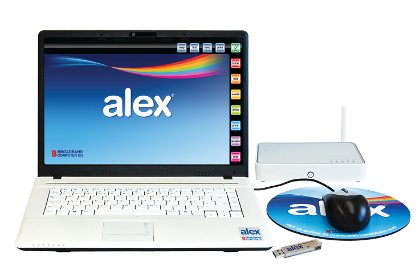Linux laptop takes the strain for technophobes

A Newcastle-based company has launched a Linux-based laptop and support package designed to encourage technophobes online.
Built by the Broadband Computer Company, the Alex laptop runs an operating system based on Ubuntu Linux and a set of applications that have been written in-house. The laptop's features have been vastly simplified, and updates are applied automatically without prompting the user, according to company co-founder Andy Hudson.
Hudson said the aim is to simplify the experience of using a computer for those people who are annoyed or frustrated at their experience of IT.
"We're targeting the disenfranchised people — we think there are 10 to 12 million of them — and the six million frustrated people," Hudson said. "It gives people who have been alienated or are scared of computers the chance to find out what they've been missing."
Customers buy the laptop, which comes with a USB 'latchkey' to log into the machine, then pay a monthly fee for access and support. The Alex was officially introduced on Thursday, but began its rollout with a 'soft' launch in November 2009.
While Hudson's sizing of the market may be optimistic, 31 percent of UK households do not have a broadband connection according to EU figures, suggesting there are large parts of the population that remain technophobic or cannot afford to get online.
As part of the streamlining, the Alex's security software is delivered automatically without prompting the user. Downloads from risky sites are blocked by default, although the company did not say how up-to-date the list of risky sites will be, and what criteria are being used to designate a site as risky.

Further simplification is provided by automatically saving documents after every keystroke, so users do not need to remember to hit the save option manually. The Alex also has a mail icon in each application, which attaches the document to an email.
Most of the software has been written in-house. The company decided not to use OpenOffice applications because they are written for a technically literate audience, Hudson said.
Hudson had earlier suggested that the company would seek Linux developers to increase the variety of applications available, but speaking to ZDNet UK he backtracked on this, saying it was "early days".
The Alex subscription includes phone support for users if they encounter difficulties.
The subscription packages will not be cheap. Customers will have to pay an upfront charge for the hardware of around £400 in addition to the monthly charge of £10 for support and access to their Alex profile via the USB key. Broadband, provided by Eastleigh-based ISP Murphx, is an optional extra for an additional £15 per month. Contracts typically last 12 months.
Applications include a word processor, a spreadsheet package, read-only presentation software, a web browser, an email application, a media player, a photo editor and an RSS reader. The USB key will also act as authentication to allow customers to access their files from any Alex machine connected to the internet.
The Alex venture is three years old, but commercially still in its early stages. The firm is still a proof of concept, Hudson admits, but it has secured £1m of funding from a venture capitalist to help grow the business.